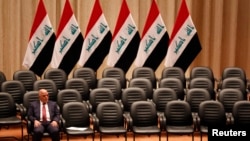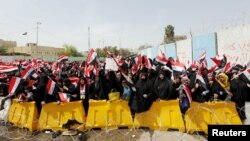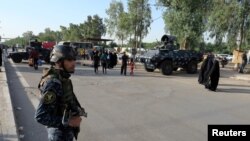Although protesters demanding political reform have retreated from Baghdad’s streets, the underlying challenge to Iraq’s leadership and stability is not over.
Negotiations between the country’s highly polarized political factions have failed to produce solutions, and its parliament is now so fractured that it cannot even gather a quorum. Talks of replacing the government with a transitional cabinet are in the air.
“The country’s political situation is an absolute mess,” Iraq’s former national security adviser and member of parliament, Mowaffak al-Rubaie told VOA.
The crisis came to a boil two weeks ago when protesters led by Shi’ite cleric Muqtada al-Sadr stormed into the parliament building in the capital’s fortified International zone, demanding government reform.
Sadr’s bullying power, backed by Iraqis fed up with a lack of basic services and massive corruption, shook the nation’s already weak political leaders.
Stuck in place
Prime Minister Haider al-Abadi’s attempts at a partial cabinet reorganization have failed to appease the political parties.
The resulting disarray has left the country split along Sunni, Shi’ite and Kurdish lines, each with its own array of squabbling political factions and armed and trained militia forces.
There is concern the chaos is distracting Iraqi leaders from the fight against Islamic State extremists.
One veteran political leader, speaking on condition of anonymity, told VOA the government had recalled some of its Iraqi army units from the frontline to protect the capital. He said some pro-Iran Shi’ite militias also had been pulled back in Baghdad.
Fearing what a total political collapse would do to the stability of the region, the United States, neighboring powers including Iran, and the United Nations are working behind the scenes to help negotiate a solution.
But Sunni lawmaker Shatha al-Obosi said there is only so much figures like U.N. special envoy to Iraq Jan Kubis could do.
“He can make progress, but only when we understand that the solution is in our hands, will Iraq reach the point that it can start fixing itself,” Obosi said.
Jockeying for power
In the meantime, different groups are trying to fill the vacuum, jockeying for positions and power.
A group of former Saddam-era army generals is proposing a military takeover. The bloc wants to cut off Iran’s strong influence in Iraq and establish a nationalist state, and says it is ready to work with Sadr, the Kurds and the United States to get there.
Other Sunnis are calling for a repeal of de-Baathification, and guarantees they can return to their traditionally Sunni cities after the eviction of Islamic State militants. They have also put forward the idea of an autonomous Sunni region in western Iraq.
The Kurds are saying the time is ripe for independence, and are holding back their lawmakers from parliament as a bargaining chip.
The Shi’ites want to keep the power they have gained since Saddam’s fall. Concerned that Sadr’s street movement could divide Shi’ites between pro-Iran and Iraqi nationalist factions, sources tell VOA that Tehran has ordered Sadr to stand down. But it is not known how compliant Sadr will remain.
"Things are at a breaking point. The situation is so bad, it demands change, but it appears the goodwill is not there,” said Sara Allawi, who represents former vice president Ayad Allawi.
“What we have been calling for is [for a] transitional national salvation government not to exceed two years,” Sara Allawi said. Allawi is a secular Shi’ite who has fought for Sunni rights in the past.
Larger problems loom
The idea of a transitional government, although not necessarily Allawi’s version, is gaining traction among some groups, but it is unclear who would be able to lead it. Even if it digs itself out of the current political morass, Iraq faces even larger problems.
Slammed by the drop in oil prices and years of corruption, Iraq is facing an economic and social crisis. On top of that, it still has to cover the cost of the war against Islamic State extremists.
And soon it will also have to pay to rebuild the largely Sunni cities shattered by war and replete with IS-planted explosives. Until those cities are habitable there are more than three million displaced and impoverished Sunnis in the country who have nowhere to go. Another three million are expected to join that number when IS-held cities are liberated.
Unlike those Sunnis who fled the Islamic State onslaught, this second three million will most likely be seen as complicit with the extremists, brainwashed, and potentially radicalized.
Add to that the roughly 15,000 Sunni tribes people the United States is said to have armed and trained to fight IS, and Iraq will soon have more than six million homeless, disenfranchised, and increasingly frustrated Sunnis to deal with.
If left unattended or allowed to fester under the current economic and sectarian policies, these challenges could quickly push the country back into an even deeper and more destabilizing crisis.







